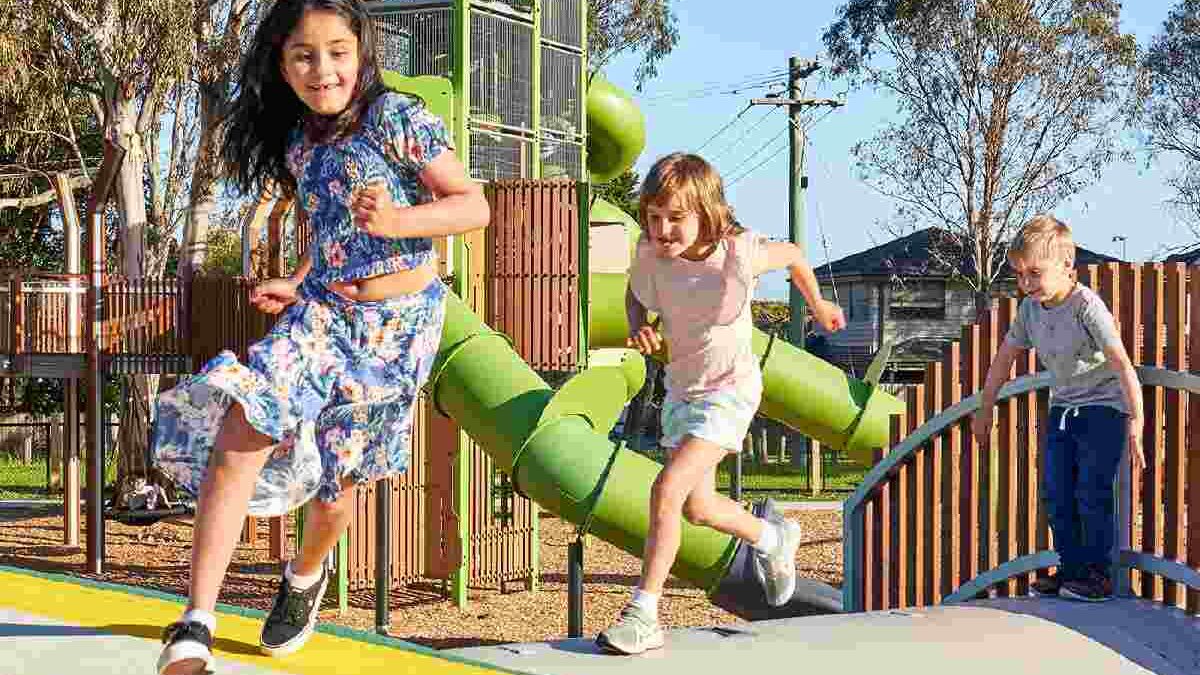Educational TV shows, apps, and electronic toys are all the rage with parents who want their kids to develop healthy brains and bodies. Research has shown that certain TV shows and apps can teach reading, STEM, and other foundational skills. Some of these tools may even help children learn skills like self-control, labeling emotions, and even practicing mindfulness. Some — but not all — toys can facilitate development in problem-solving, social skills, and creativity.
However, effective as these tools can be, they’re no replacement for a good, old-fashioned (or even hyper-contemporary) playground. Nothing beats the unique combination of physical activity, social interaction, and cognitive development that can take place on an outdoor playground. Read on to learn about some of the ways that outdoor playgrounds can influence and support health development in children of all ages.
Cognitive Abilities and Problem-Solving
Navigating the playground is an exercise in problem-solving and developing critical thinking skills. Children use their brains to gauge distances, solve navigation puzzles (what’s the easiest route up this climbing structure?) and remember how components work. Consider swing playground equipment: they learn when to pump their legs to move or exactly when to jump off to land on their feet. Each activity expands their cognitive skills as they explore and play.
Outdoor playgrounds add new levels of challenge: they need to understand a few things about nature and the weather. On a hotter or cooler day, they might learn to be careful when touching metal surfaces, so as not to hurt their hands. If it’s rained recently, they need to think about slippery surfaces and how to move more slowly and deliberately. Outdoors, there are also opportunities to practice Identifying unfamiliar plants, insects, birds, and squirrels.
Physical Health and Motor Skills
Memorizing a TikTok dance is great cardio, but it can only do so much for the development of strength and cardiovascular fitness. Unless you’ve got a mansion with serious square footage, playing at home just can’t match the freedom of running and climbing outdoors. On the playground with the wind in their hair, kids can really let loose and build up muscle, flexibility, and endurance. From swinging on monkey bars to pushing the merry-go-round, it’s all exercise.
Moving about on the playground, however, isn’t just about working up a sweat and getting the heart pumping. It’s also one of the ways kids develop critical motor and proprioceptive skills that will serve them throughout their lives. Climbing, hanging, and swinging on the jungle gym, running on the sand, and more, can improve balance, coordination, and body awareness. These important developmental strengths can breed aptitude in other areas like sports and even the arts.
Relationship Building and Social Skills
Outdoor playgrounds are one of the easiest ways for kids to meet other children of all ages and from all walks of life. Unlike enclosed facilities, where they’ll only interact with schoolmates or daycare buddies, public outdoor playgrounds include everyone. Outdoor playgrounds offer a chance to connect with people from other cultures, socioeconomic backgrounds, religions, and more. Kids can learn to make friends and form genuine connections with all types of people.
This kind of relationship building can also help kids prepare for future developmental milestones, like making friends as teens and adults. The playground can teach them lifelong lessons about finding like minded peers, resolving conflicts, and managing rejection. Especially kids who spent their childhoods in a pandemic pod or making friends through Zoom school, this is a life-changer. It might be a real chance to practice manners, overcome shyness, and more.
Fresh Air, Sunshine, and Dirt
The relationship between time spent outdoors and positive developmental outcomes is well-established by a number of different research studies. Vitamin D can play a role in bone growth, immune function, and other vital body functions. Natural sunlight in general can help improve mood and reduce the risk of depression in children (and adults). Exposure to sunlight also helps regulate kids’ circadian rhythms and get better sleep for healthier development.
There’s also some evidence that when kids play outside, and with dirt in particular, it can improve their immune systems. This likely has to do with exposure to microorganisms in the dirt, of which there are billions. Playing in dirt can reduce kids’ risk for developing allergies and even autoimmune disorders. It’s clear that time outdoors, especially on sunny days, is an overall plus for kids’ physical and mental growth.
Inclusivity and Accessibility for All
If they’re designed properly, playgrounds can provide developmental opportunities not just for some, but for all. Many outdoor playgrounds feature wheelchair-accessible pathways and even whole jungle gyms meant to be accessible. Adaptive swings are also another useful feature that enable kids with special needs to swing without the risk of falling. There are also many options for deaf and hard-of-hearing children, kids with sensory needs, and those with other disabilities.
The advantage of designing inclusive, accessible spaces is, of course, that folks with disabilities can use them. However, that’s not just an advantage for kids with disabilities, but for everyone else in the community. Inclusive features can make it possible for older or disabled parents to get involved in play, and foster healthy behavior in their kids. They can also help teach children without disabilities how to keep an open mind, include others, and treat all peers with respect.
Everything Playgrounds Aren’t
In spite of all these benefits, perhaps what’s most important about playgrounds in today’s world is all the things they aren’t. Time spent at the playground is time not spent watching screens, wandering a mall, mindlessly eating junk food, or — worst of all — subway surfing. When kids are happy and playing outside with their friends, they’re less likely to get into trouble or engage in bad habits. Well-designed, supervised playgrounds are a healthier, safer alternative for all.

